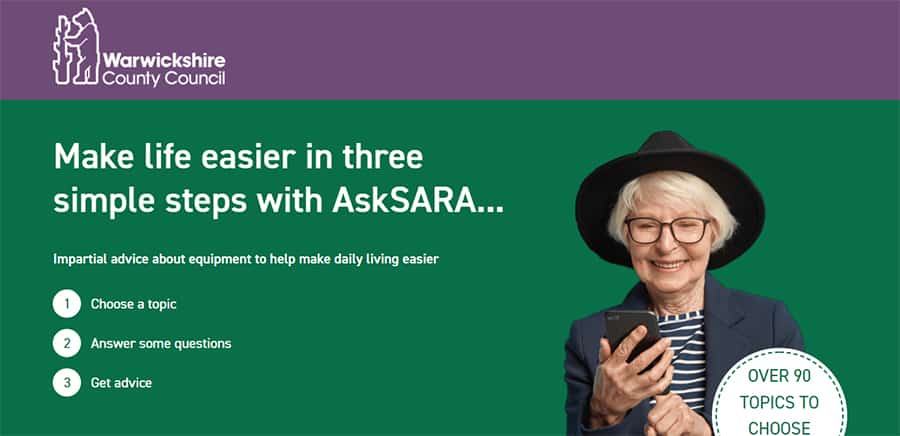Local authority signposts residents to practical tool about helpful assistive tech solutions

Warwickshire County Council is promoting the use of a helpful tool to residents, which aims to give people educational information and advice about a broad range of assistive technology solutions that support independent living.
The tool, AskSARA (self-assessment, rapid access), is free to use and designed by the charity Disabled Living Foundation (DLF). AskSARA produces impartial advice, written by occupational therapists, about suitable aids and adaptations for over 90 topics of daily living for older and disabled people.
Topics on AskSARA include bathing and toileting, getting dressed, communicating, mobility, hearing, stairs, medication management, and living arrangements.
As well as being available nationally via the DLF, AskSARA can also be licensed for more targeted local versions, which is the case with Warwickshire County Council.
AskSARA Warwickshire provides advice on handy solutions; ideas to help make daily living easier; and guidance on services in Warwickshire that can support people to make choices about their own health and wellbeing, so they can stay well and independent for as long as possible.
Councillor Margaret Bell, Warwickshire County Council’s Portfolio Holder for Adult Social Care and Health, commented: “AskSARA is a really helpful and easy to navigate resource which offers everyday solutions to residents so they can manage household tasks which, for a variety of reasons, may be difficult for them.
“It’s for adults of all ages who need a selection of helpful options to make things easier at home. It’s also a great tool for carers, family members and social care workers to understand needs of those they care for and how to meet them.
“There’s an extensive variety of assistive technology out there that is really simple to use, but sometimes people don’t know what exactly it is they need to support themselves or their family members.
“The AskSARA website presents them with the information, advice and guidance that they need.”
AskSARA features a useful self-assessment tool that can produce an individual report with suggested ideas, information, and advice, based on the answers to some simple, multiple-choice questions.
Suggested assistive technologies include items like rollators, reminder clocks, access ramps, jar grippers, bathroom grab rails, and much more. These can all play a part in increasing client confidence, reducing dependence on others, and freeing up carers’ time to deal with complex cases.
One Warwickshire resident, who had a stroke and lived alone, was left unable to carry out some of his daily activities when he returned home from hospital.
His social care practitioner at Warwickshire County Council said: “The gentleman needed some support to help him to stay safe at home for a few weeks as he became stronger and more able to look after himself.
“He tended to forget when mealtimes were, often forgot to take his medications and to drink regularly to stay hydrated. He also struggled to walk and carry his meals and drinks to and from his kitchen.
“To help him manage at home, he used a reminder clock called a MemRabel. This was set up with gentle prompts to remind him to take his medications and to eat and drink.
“Alongside the MemRabel, he also used a kitchen trolley to transport his meals and drinks to where he wanted.
“The equipment has enabled this gentleman to stay mobile and safely manage these tasks by himself. This has, in turn, helped his wellbeing by keeping him physically and mentally active and giving him a sense of normality, because he can now better manage these tasks by himself.”
View AskSARA Warwickshire here.
In 2020, the DLF updated the national AskSARA resource to be more mobile-friendly with a refreshed and modern look.

